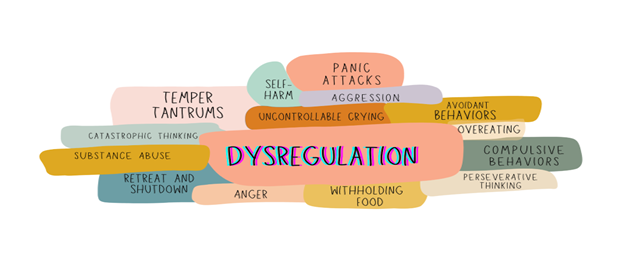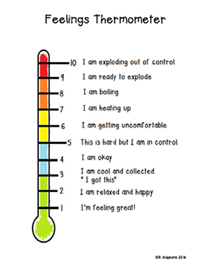HayU Blog
Dysregulation: Tales from Parents in the Trenches
November 21st, 2025

As parents, it’s hard to know what to do in the face of our child’s emotional and behavioral dysregulation, no matter their age or how their dysregulation manifests. I recently sat down with two of our directors, Courtney and Hunja, to talk about how dysregulation manifests in our respective children.
When My Child Dysregulates, So Do I
Panic sets in when I get another yellow incident slip from preschool. My four-year-old hit another child.
Within minutes, I'm Googling occupational therapists and drafting an email to the developmental psychologist asking if this is normal, if we've missed something, or if there's an intervention we should have started months ago. I'm calling my best friend to make sense of what just happened.
It all feels urgent. If I just make the right call or send the right email, I can fix this.
But then my husband puts his hand on my shoulder. "Take a beat," he says. "Don't make any decisions until tomorrow."
And he's right. Because when my son is dysregulated, I am too. I'm just better at hiding it.
Sometimes the most helpful thing I can do is nothing. At least, not yet. Not while my heart is racing, my thoughts are spinning, and I'm catastrophizing about kindergarten.
- Courtney Wittner, parent of two (7 and 4)
When my own children were little and loud, frequent criers, especially daughter number two, I learned that her loud crying was a real trigger for me that made me feel cornered, brittle, attacked, and poised to attack back. I knew I should stay calm, but couldn’t always do so in the face of her triggering volume. I had to learn to use deep breathing to recenter myself before acting or even give myself a timeout in another room behind a closed door before I could interact with my dysregulated, screaming daughter. If only we had our own self-regulation dial that we could turn down to counterbalance our child’s dysregulation (a dial to regulate them would be nice, too!).
Therapists often have their patients rate their own levels of emotional intensity on a scale of 1-10 (a 10 being the most distressed). A trusted colleague of ours, Allison Burgess, LMFT, shared that she coaches her teen and emerging adult patients never to make important decisions when they are at level 7 or up. We loved this advice! In fact, none of us should make important decisions when we are at level 7 or above.

Jumping right into problem-solving mode is a common parental reaction to our child’s dysregulation. We may try to reason our children out of their strong feelings and behaviors when sometimes we just need to sit quietly while they melt down. With younger children, pre-planning how we will handle the next meltdown can help things go more smoothly the next time. You can even try asking your child, as developmentally appropriate, what they want/need in these moments and create a plan.
3,000 Miles Away
Another call from my 19-year-old daughter in college. The third call today in as many hours.
Sobbing. Talking a mile a minute to download the situation. Rapid-fire questions. Desperately trying to co-process with me on the phone during my workday.
“Slow down, I can’t understand you,” I begin…
Anxiety fills my chest and stomach as I try not to become frantic in the face of her utter dysregulation.
I remember my parent coaching; I hold back…just a few seconds…attempting to control my instinct to jump in with reassurances and solutions.
"What are you looking for from me right now...do you just want me to listen, or are you looking to brainstorm?”
- Amy Hayutin Contreras, parent of two (23 and 17)

If your child is becoming dysregulated with frequency and it’s impacting your family’s routines and quality of life, it may be time to consult medical professionals to determine the root causes of the dysregulation your loved one is experiencing and to inform potential treatments and interventions. Occupational Therapy, Speech & Language Therapy, and parent coaching with licensed therapists may be invaluable for your family. Or perhaps psychotherapy, addiction treatment, chronic pain management, or medication is what your child needs.
Fortunately, there is so much that we as parents can do to anticipate triggers and prevent dysregulation. We’ve included some resources at the end of this article.
A Powder Keg of Triggers
My 7 year old son is autistic and non-speaking. And he LOVES airplanes and points them out every time we are out. Getting on an airplane is always the highlight of his year, but the only way onto an airplane is through an airport.
A loud, noisy, chaotic cauldron of people, baggage, escalators, overhead announcements and security check-points.
We have found it helpful to map out exactly what we are going to do on the way to the airplane.
We use simple picture stories that show
where we will park the car,
how we then drop off our baggage,
how we will then go up to the TSA check-point,
how we will then go to our gate and then wait for the plane.
What we can control, we control.
We aim to get to the airport 3-4 hours early for international flights.
We take advantage of TSA Cares, a TSA service for families with disabled individuals to make the security checkpoint experience as hassle-free as possible for people with sensory sensitivities.
We’re enrolled in CLEAR, TSA PreCheck, and lounge access through our credit card benefits.
Even on the harder days, the dysregulation isn’t as disorienting as it could be because of our advanced preparation, communication, and preventative measures in anticipation of our son’s triggers.
- Hunja Koimburi, parent of three (11, 7, and 3)
How old is your child? How does their dysregulation manifest? What are their most frequent triggers? Are there steps you can take to avoid the triggers? What are your adult go-to responses to your child’s dysregulation and your own potential triggers? Identifying these factors can help you come up with a plan that will work for your family in the face of your child’s dysregulation.

Partner, Hayutin Education
Resources
- Emotional Dysregulation Cleveland Clinic
- Sensory Strategies from Courtney Duckworth-Harris and The Kinder Clinic
- Good Inside by Dr. Becky Kennedy
- 1-2-3 Magic by Thomas Phelan
- How to Talk So Kids Can Listen and How to Listen so Kids Can Talk by Adele Faber and Elaine Mazlish
- Your Defiant Child by Russell Barkely and Christine Benton & Your Defiant Teen by Russell Barkley and Arthur Robin, with Christine Benton




